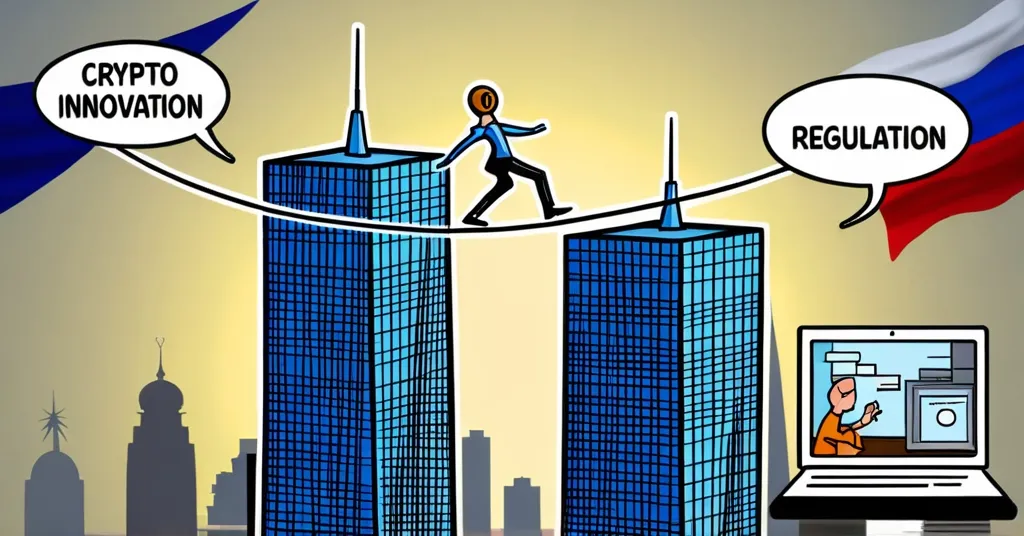BestChange Unblocked in Russia After Brief Ban: Navigating Crypto Regulatory Challenges

Russian Crypto Aggregator BestChange Unblocked After Brief Ban, Highlighting Regulatory Tightrope
On February 10th, the Russian crypto exchange data aggregator BestChange was abruptly blocked by the federal communications watchdog Roskomnadzor, only to have its website restored on February 20th. BestChange, a service known for providing users with comprehensive exchange rate data and comparison tools for cryptocurrencies, faced this block due to suspected violations of a new law on advertising that prohibits the promotion of cryptocurrencies in Russia. Despite the disruption, BestChange smartly pivoted to a mirror site hosted outside of the country, ensuring minimal impact on its users.
- BestChange blocked Feb 10, unblocked Feb 20
- Block likely due to crypto advertising law
- Service continued on mirror site during block
BestChange, essentially a website that helps users compare exchange rates for cryptocurrencies, found itself in the crosshairs of Russia’s tightening regulatory grip. The block was attributed to a recent amendment to Russian advertising laws passed in August, which bans any promotion of cryptocurrencies. This reflects Russia’s cautious dance with digital currencies, balancing between embracing their potential and clamping down on perceived risks. BestChange’s quick pivot to a mirror site—a backup website hosted in another country—demonstrates the agility required to navigate such regulatory landscapes.
Russia’s relationship with cryptocurrencies is indeed a high-wire act. On one hand, President Vladimir Putin has declared cryptocurrencies as a legal form of property, signaling acceptance. On the other, regulatory agencies are tightening the screws on crypto-related advertising and operations. This dichotomy is further complicated by Russia’s recent moves to legalize and tax crypto mining, and to allow the use of cryptocurrency for international transactions—moves aimed at harnessing blockchain technology’s potential while navigating international sanctions.
This incident with BestChange reflects the broader regulatory landscape in Russia. Despite the crackdown, the country ranks seventh globally in cryptocurrency adoption, according to Chainalysis’s 2024 report. This high adoption rate, coupled with recent regulatory developments, paints a picture of a nation trying to balance innovation with control. Russia’s crypto mining sector has grown significantly, becoming the world’s second-largest behind the United States, with major state companies like Gazprom Neft and Sberbank finding crypto mining beneficial amidst Western sanctions.
Amidst these developments, discussions are reportedly underway to introduce cryptocurrency exchange programs at major Russian exchanges like the Moscow Exchange and St. Petersburg Currency Exchange. Such moves could potentially streamline the country’s crypto market, offering a regulated pathway for investors and users alike. However, the path forward is fraught with challenges. For every step towards embracing cryptocurrencies, there seems to be a countermove clamping down on certain activities. The incident with BestChange serves as a stark reminder of the uncertainties that crypto businesses face in Russia.
While Russia’s move to legalize crypto mining is seen as progressive, critics argue it’s a double-edged sword. It might attract more scrutiny and tighter regulations, potentially stifling innovation and user freedom in the crypto space. Russia’s flip-flopping on crypto laws is giving businesses a headache—time to make up their mind! Meanwhile, the energy sector in Russia has benefited from crypto mining, as miners require substantial power, which is provided at competitive rates in regions like Irkutsk, Sverdlovsk, and Krasnoyarsk. This has helped convert unsellable energy into cryptocurrencies, showcasing the potential economic benefits.
Russia has also been using cryptocurrencies to circumvent Western sanctions, particularly in international trade with countries like China, India, and the UAE. The Russian central bank has highlighted delays in cross-border payments as a significant issue, prompting the use of cryptocurrencies. However, this strategy may face challenges due to the reluctance of trading partners to accept digital assets and the increasing monitoring capabilities of Western regulators. The U.S. Treasury Department’s Office of Foreign Assets Control (OFAC) has intensified efforts to restrict Russia’s cryptocurrency activities, with actions against companies like BitRiver, indicating a potential escalation in sanctions enforcement.
As Russia continues to navigate its stance on cryptocurrencies, services like BestChange will need to remain agile, ready to pivot at a moment’s notice—whether to a mirror site or a new regulatory compliance strategy. Understanding these dynamics is crucial for enthusiasts and investors as they navigate the opportunities and obstacles within Russia’s crypto landscape.
Here are some key takeaways and questions to consider:
- What led to the blocking of the BestChange website?
The BestChange website was likely blocked due to violations of a new Russian law on advertising that prohibits the promotion of cryptocurrencies and related services.
- How did BestChange continue to operate during the website block?
BestChange managed to continue its operations through a mirror site hosted outside of Russia, ensuring service continuity for its users.
- What recent actions has Russia taken regarding cryptocurrency?
Russia has legalized and begun taxing crypto mining, allowed the use of cryptocurrency for international transactions, and declared it a form of property under President Putin’s leadership.
- How does Russia rank in global cryptocurrency adoption?
According to Chainalysis, Russia ranks seventh in global cryptocurrency adoption in 2024, showcasing strong interest in digital currencies despite regulatory hurdles.
- What does this incident indicate about the regulatory environment for cryptocurrencies in Russia?
The BestChange incident highlights the ongoing tension between crypto services and the evolving legislative framework in Russia, reflecting a regulatory environment that is both embracing and restricting cryptocurrencies.
Russia’s approach to cryptocurrencies is a fascinating study in contrasts. While the country seeks to leverage the benefits of blockchain and digital currencies, it remains vigilant, wary of the risks and potential for misuse. For enthusiasts and investors, staying informed about these regulatory changes is essential, as they can significantly impact their investments or use of services like BestChange.



